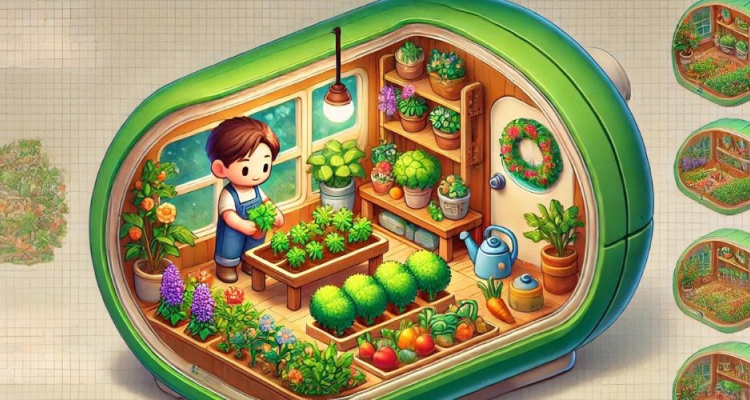
Amazing News!
The Rise of Cozy Indie Games: Tiny Garden's Success in a Nostalgic Toy World
In recent years, there's been an increasing appetite for cozy and compact games that evoke nostalgia while providing a tranquil experience. This desire is evident in the significant support seen for small indie projects. One such example is Tiny Garden, a charming farming and gardening simulation game set inside a toy capsule from the '90s. Its success story in the crowdfunding space highlights a growing trend towards simpler, more relaxing video games.
Chapter 1: The Concept Behind Tiny Garden
Tiny Garden is not your typical farming simulation game. Set inside a miniature toy ball that opens at a hinge, it brings back memories of Polly Pocket toys, giving the game an added nostalgic edge. The game world is made of plastic, yet remarkably, in this virtual realm, plastic can indeed be fertile. Plastic seeds, when planted, grow into various plants and veggies, all thanks to a spinning plastic crank that works as a whimsical farming tool. In this tiny universe, you initially cultivate basic crops such as carrots and turnips. These modest beginnings pave the way for trading and upgrading to more sophisticated vegetables, plants, and decorative elements for your miniature farm. As you enhance your garden, you also have the opportunity to furnish a petite home nestled in the upper half of the capsule with cozy items like a bed, nightstand, fireplace, and miscellaneous trinkets.
Chapter 2: Appeal of Simplicity
Tiny Garden’s allure lies largely in its simplicity. Unlike many modern games that are packed with complex elements like role-playing components, mini-games, puzzles, and combat challenges, Tiny Garden offers a straightforward experience with no stakes or failure conditions. This uncomplicated approach has a broad appeal, catering particularly to those who seek a relaxing gaming experience that doesn't demand extensive time or effort. The concept clearly resonates with many, as evidenced by the game's impressive Kickstarter success. The studio behind Tiny Garden, Ao Norte, initially set a modest fundraising goal of $5000. However, the project far exceeded expectations, amassing over $22,000 within just a week of going live. This overwhelming support underscores a widespread enthusiasm for games that are as unpretentious as they are engaging.
Chapter 3: Community Support and Stretch Goals
As the fundraising campaign for Tiny Garden surged past its original targets, the developers began introducing new stretch goals to keep up with the support and to expand the potential of the game. Although some of these stretch goals remain undisclosed, confirmed additions include a free mode to be unlocked at €40,000 and another yet-to-be-revealed feature labeled 'free mode' at €80,000. This dynamic response to community backing is indicative of the close relationship between the developers and their audience. It’s also a testament to the growing cultural shift towards crowdfunding as a viable model for indie game development.
Chapter 4: Upcoming Platforms and Accessibility
Looking forward, Tiny Garden is being developed for both Nintendo Switch and PC platforms. On top of that, the developers have a goal of getting the game verified for the Steam Deck in the near future. This multi-platform approach aims to make the game accessible to a wider range of gamers, ensuring that anyone interested in this quaint and cozy experience will have a chance to enjoy it on their preferred device.
Chapter 5: Conclusion
Tiny Garden’s rapid rise in popularity is yet another affirmation of the growing appetite for simple, peaceful gaming experiences that transport players to calmer worlds. The game’s unique setting inside a nostalgic 90s toy, combined with its straightforward gameplay and charming aesthetic, has struck a chord with many. As the developers at Ao Norte continue to adapt and expand the project in response to its burgeoning support, it becomes clear that Tiny Garden is more than just a game—it's a marker of a broader movement within the gaming community. Cozy, small-scale games are here to stay, offering respite from the demanding nature of larger, more complex titles.
While we await the full release of Tiny Garden, those interested in similar indie experiences might explore some of the best indie games available on the Nintendo Switch. These titles can provide a taste of the cozy, engaging fun that has made games like Tiny Garden so compelling.





